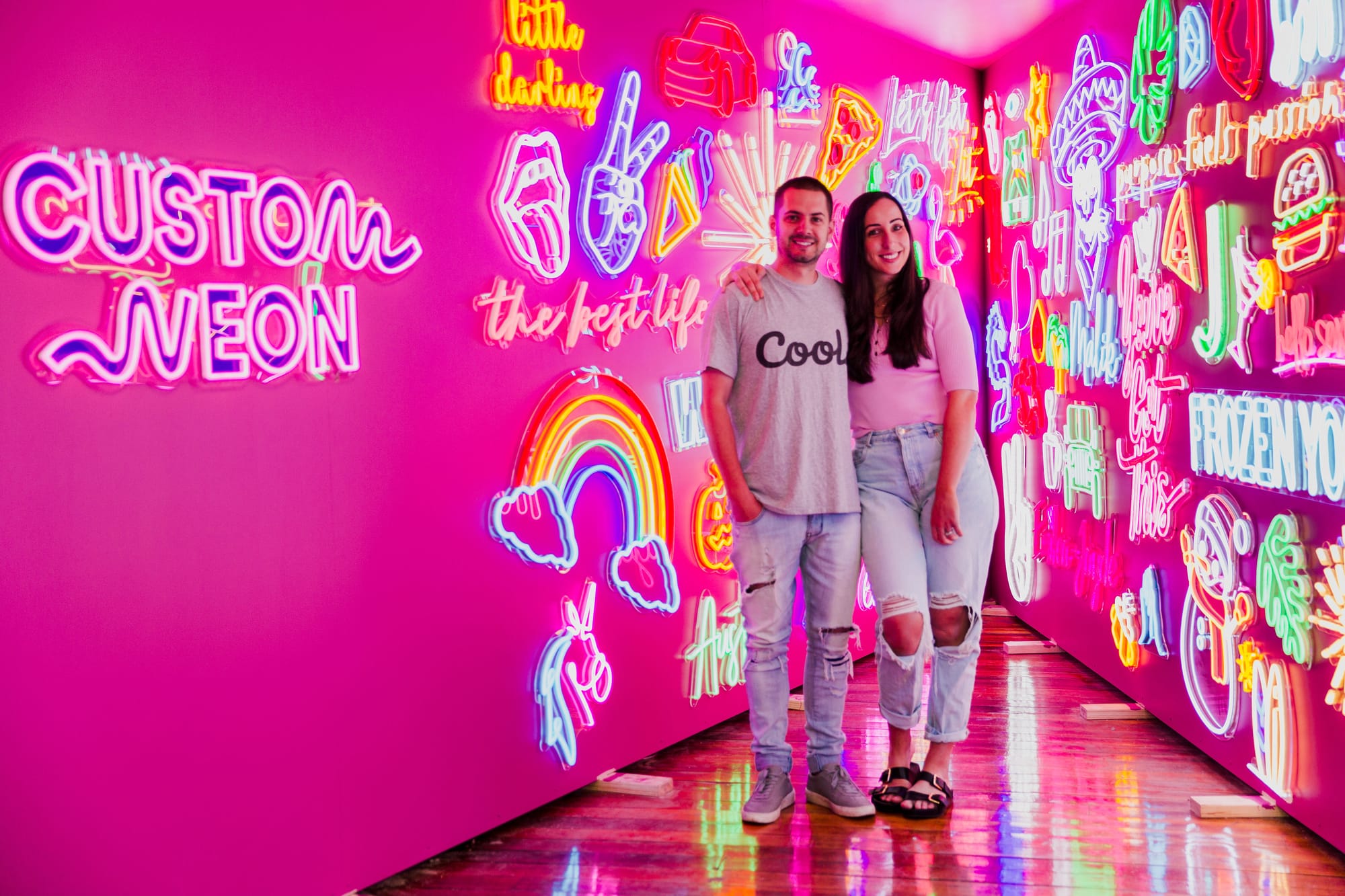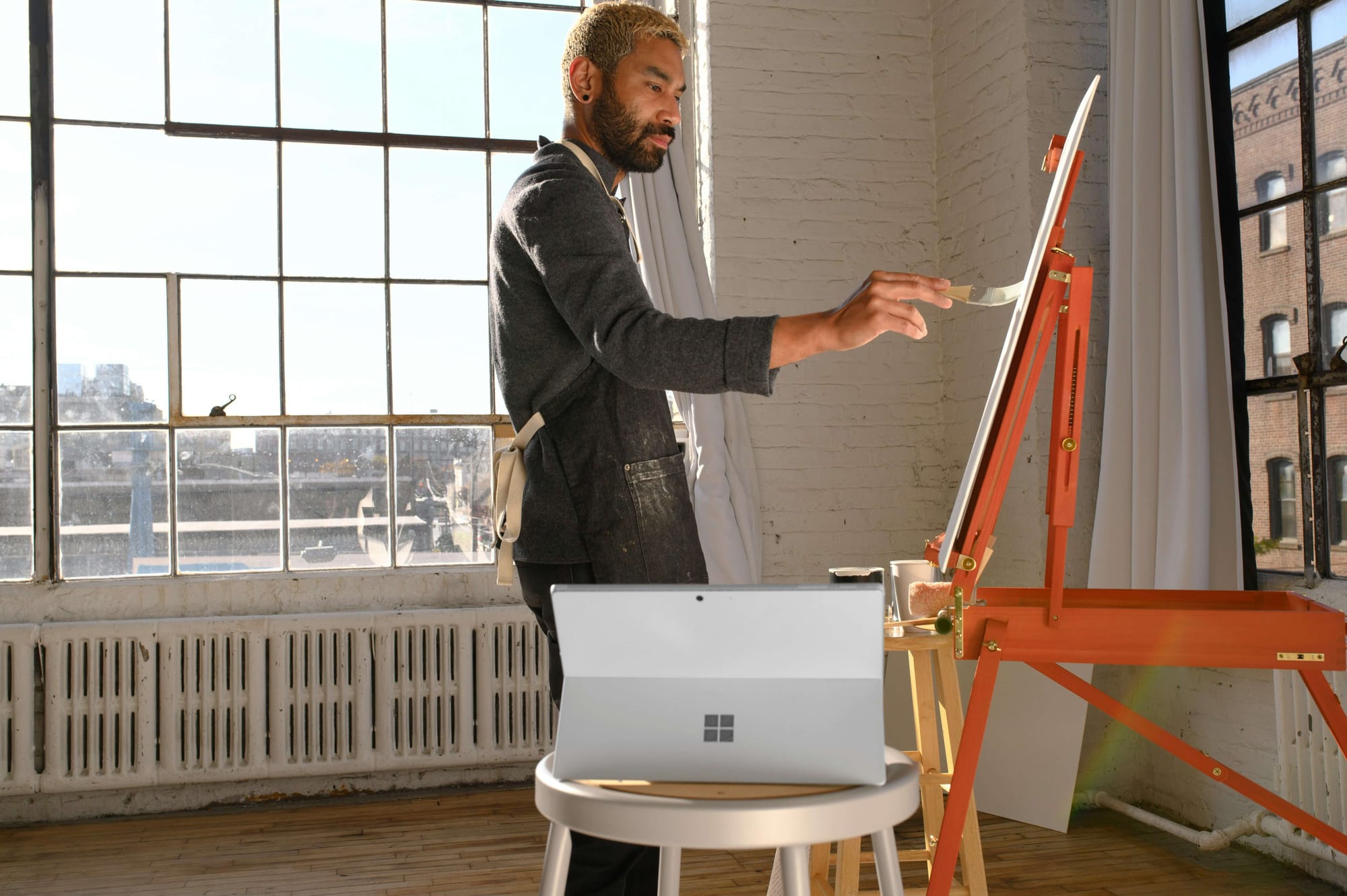
How We Turned an Opportunistic Side Hustle Into an 8-Figure Business
Jake and Jess Munday didn’t plan on building a neon sign empire, but some smart decisions along the way helped them turn an exploratory side hustle into a massively successful business.

Co-Founder of Custom Neon
My wife Jess and I were not planning on starting a company when the idea for Custom Neon came into our lives. Jess was on maternity leave with our first baby from a role that she loved and fully intended to return to. I was already running a very successful teeth-whitening e-commerce business.
But then, we tried to purchase a custom neon sign for my son’s room and found it more difficult than we anticipated. With my years of experience in e-commerce and social media marketing, I immediately felt like there was a gap in the market and that we had the potential to fill it. It felt like an idea we couldn’t not explore.
I’m so glad we did. Within three months of deciding to test the idea as a side hustle, we were selling $10,000 worth of signage per week. By the end of our first year, we had brought in several hundred thousand dollars in revenue, and we decided to both focus on this full-time. Now, five years later, we’re averaging over $1 million in sales each month.
Looking back, here are five of the things that helped us grow to where we are today.
1. We found a way to test the market before we dove in
Before we purchased a single neon sign, I placed ads on Gumtree and Marketplace to see if there was interest from potential customers, using generic neon sign imagery I found online. When people reached out that they were interested, I told them that the product was unfortunately no longer available, but I would be in touch if I got more in stock. We were getting a handful of inquiries each day, which may seem small, but this was just a local ad. It was a really promising sign for us to move forward.
Still, we didn’t want to invest too much upfront. We decided to use our own wedding as an excuse to buy a few neon signs that we would begin to rent out as a way to gain capital for the business, which cost us about $250. The aim was for the pictures from our wedding to demonstrate the ambiance and aesthetic that you can create with strategically placed LED neon signs, driving demand for similar signs from other engaged couples.
It worked: Before we knew it, the rental calendar for our initial signs was full, and we had begun getting inquiries about custom signs. It soon became clear this business could be so much bigger than the side hustle gig we anticipated.
2. We let UGC and word of mouth drive sales
During the first 12 months, we didn’t need to spend a dime on advertising, instead relying on user-generated content (UGC) and word-of-mouth marketing to fill up our social accounts and get us in front of new customers organically.
We used the images from our wedding to seed an Instagram account. As we rented out the signs, more and more customers tagged us on their social posts, delighted with how impactful the signs had been at their events. We encourage this in the obvious ways: Every time we ship a sign, we include a note asking a customer to share the final result in all its glory and tag us.
But I also think the genuine excitement we have when posting about other customers’ signs makes people excited to share their experience, too. The incredible, authentic photos that our customers take of our products populate our website, social channels, and more (we always ask for approval first), and other customers want to see their signs given the same fanfare. It builds rapport with our customer base that makes them want to be brand advocates.
Even once we started investing in advertising, UGC played a critical role. For instance, when we made our first commercial, we included a section of photos from real customers showing off their neon signs. Doing this demonstrated the scope of our products, helped build trust with people who hadn’t heard of us before, and drove aspirational desire for other customers to make their neon sign dreams come true.
3. We built our brand with SEO experts
One significant partnership I must mention here was bringing on Matt and Teresha Aird as co-owners of the business. They are veterans in the SEO, digital publishing, and marketing space with over 40 years of experience under their belts and really filled gaps in my own expertise. They had helped me exponentially grow my previous startup, so when the Custom Neon opportunity came up, it was a no-brainer to get them on board once again. Once Jess and I had taken things as far as we could with social media marketing, we called them up.
They overhauled our website and recommended a rebrand. We were originally called Neon Collective, and they helped us realize there was a lot of ambiguity in that name. We decided to move to Custom Neon, an extremely simple business name that clearly describes what we do. This no-nonsense branding was necessary in order for us to realize our global ambitions.
Plus, having such a keyword-driven name, combined with a comprehensive SEO strategy, has allowed us to dominate SERPs (Search Engine Results Pages) in an extremely competitive space. This, plus a lot of work optimizing our conversion rates once people landed on our website, was a catalyst for growth.
4. We gained new opportunities by expanding our target audience
The pandemic massively impacted our company. For a business that had been so focused on weddings and events, widespread lockdown pretty much wiped out 30 percent of our business overnight.
Luckily, we had already begun working with businesses as an additional sales outlet, as that's generally where the higher-yielding fruits are. When the pandemic hit, we heightened our focus there, shutting down the sign rental arm of the business and pivoting marketing and outreach strategies toward a B2B market.
To jumpstart this line of business, we quickly got to work in our local community, offering discounted and even free signage. This was beneficial to local businesses desperate to entice customers and beneficial to us, as they provided us with videos and images, which allowed us to overhaul our site content and keywords to target business customers instead of events.
Increasing marketing spend during a downturn was a risk, but opening up our target demographic really paid off. We saw a revenue increase of 163 percent from April 2020 to May 2021. This propelled Custom Neon from a seven-figure business to an eight-figure business.
I’d recommend all business owners think outside the box when it comes to revenue streams. How could you diversify your product to appeal to a different demographic and get other audiences to notice you? Sometimes, like in our case, this doesn’t actually involve changing your product at all but shifting your marketing strategy to target a different buyer.
5. We always made sure we weren’t scaling at the expense of our customer experience
In a previous business, I faced rapid growth that was exciting but unsustainable. I should have pumped the brakes, but I was too eager to push on, so I hired rapidly and reactively to fill the gaps. As a result, we experienced delays and failure in order fulfillment, dissatisfied customers, and a decline in revenue.
Now, I believe it’s extremely important for businesses looking to scale to ensure that they do it in a controlled manner with efficient and secured supply chains. With Custom Neon, I was determined to scale with consistency and control. As we grew, we continually assessed areas that needed additional resources, plugging any holes with freelancers where possible until the time was right to make permanent hires. This has helped ensure that orders could be fulfilled and customer service levels kept high at every stage of growth.
Our growth journey may seem fast, but we always make sure to prioritize keeping our customers happy above anything else—and that’s the kind of growth that I’m proud of.
Try Buffer for free
180,000+ creators, small businesses, and marketers use Buffer to grow their audiences every month.
Related Articles

Grow your reach, celebrate your community, and keep your feed full with these reposting tips and how-tos.

Stop chasing the tail-end of Instagram audio trends — here are the latest trending songs on Instagram in July 2025.

From subscriptions to UGC to merch — discover 13 ways to monetize your Instagram following, even if you don’t have a large following.